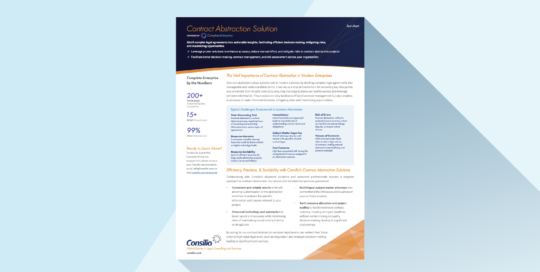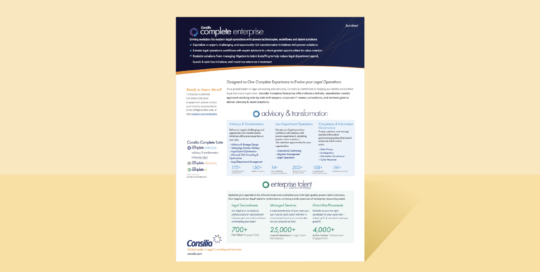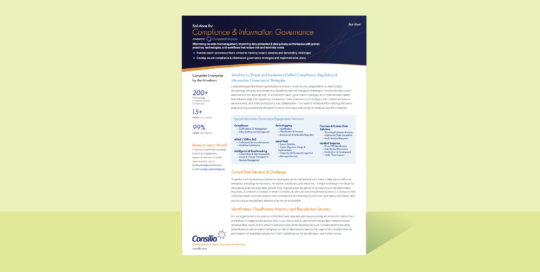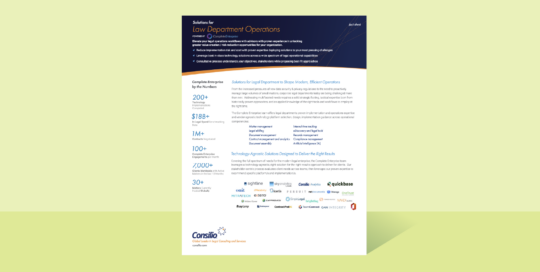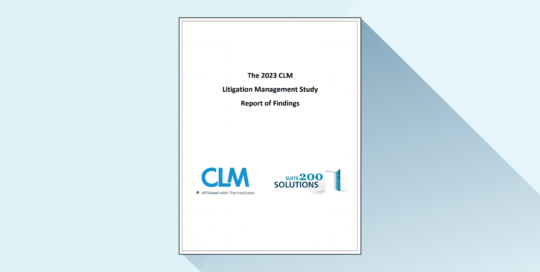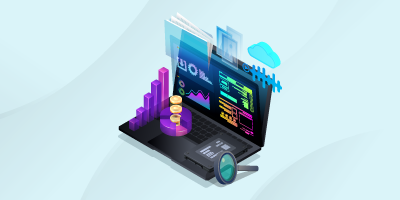Webinar: An Ounce of Prevention: Fundamentals of Data Protection For legal practitioners, a commitment to data protection is a matter of ethical duty, legal and regulatory compliance, and fundamental responsibility to clients and
Contract Abstraction Solution
Contract Abstraction Solution Distill complex legal agreements into actionable insights, facilitating efficient decision-making, mitigating risks, and maximizing opportunities Leverage proven solutions to enhance accuracy, reduce manual effort, and mitigate risks in
Webinar: Beyond the Four Corners: Evolving Electronic Documents
Webinar: Beyond the Four Corners: Evolving Electronic Documents The definition and boundaries of “document” are changing, as new source and file types proliferate and custodian behavior changes. New challenges like modern attachments,
Webinar: Diversifying Legal Technology: Reimagining Talent Acquisition
Webinar: Diversifying Legal Technology: Reimagining Talent Acquisition It’s now proven that diverse teams of employees produce more creative, innovative, and effective outcomes. For organizations in the legal technology sector, success demands that
Complete Enterprise
Complete Enterprise Driving evolution for modern legal operations with proven technologies, workflows and talent solutions Capitalize on urgent, challenging, and opportunity-rich transformation initiatives with proven solutions Elevate legal operations workflows with
Solutions for Compliance & Information Governance
Solutions for Compliance & Information Governance Minimizing records mismanagement, improving data protection & data privacy conformance with proven practices, technologies, and workflows that reduce risk and minimize costs Provide expert assistance
Solutions for Law Department Operations
Solutions for Law Department Operations Elevate your legal operations workflows with advisors with proven experience in unlocking greater value-creation / risk-reduction opportunities for your organization. Reduce implementation risk and cost with
Webinar: Off-Channel Communications: Strategies and Best Practices
Webinar: Off-Channel Communications: Strategies and Best Practices Never have there been so many communication devices, apps, and services available for use by employees, and employees helping themselves to these options can create
The 2023 CLM Litigation Management Study Report of Findings – Sponsored by Consilio
The 2023 CLM Litigation Management Study Report of Findings - Sponsored by Consilio
Webinar: Who’s the Boss: Competence, Supervision, and Flexible Legal Staffing
Webinar: Who’s the Boss: Competence, Supervision, and Flexible Legal Staffing Attorneys must meet their ethical duties of competence and supervision in all matters, but how can they fulfill those duties when they
Webinar: Hold On: Get a Grip on Conducting Effective Legal Holds
Webinar: Hold On: Get a Grip on Conducting Effective Legal Holds In a world of new and evolving sources, conducting effective legal holds is more critical than ever. Done properly, legal holds
Webinar: In Case You Missed It: A Survey of eDiscovery Cases from 2022
Webinar In Case You Missed It: A Survey of eDiscovery Cases from 2022 From questions of intent, to challenging sources, to privacy concerns, 2022 has been another year of adaptation and evolution
Webinar: Celebrating eDiscovery Day 2022
Webinar: Celebrating eDiscovery Day 2022 Join us as we celebrate eDiscovery day with a 30-minute discussion covering some notable cases from 2022, as well as some technological innovations for improving efficiency and quality while
Webinar: Cloud Watching: Strategies and Best Practices for Microsoft 365 Discovery
Webinar: Cloud Watching: Strategies and Best Practices for Microsoft 365 Discovery Microsoft 365 was already widely-used before 2020, and the rise of remote work since then has caused adoption and use of
From Rhetoric to Reality: Building a Culture of Diversity in the Legal Profession
Legal professionals give a lot of lip service to the importance of diversity and inclusion, yet moving the needle in those areas is challenging. Fortunately, there are ways you can change biased hiring and professional practices in order to transform your organization into a more inclusive and prosperous business.
How to Manage the Unexpected Resignation of a Key Legal Employee
In every legal team, resignations are inevitable – regardless of how valued your employees may feel. There is a lot to consider when a key employee resigns, and your first instinct may be to focus only on immediate workload, but it’s also important to make a long-term planning a priority.
A Framework for Recognizing and Overcoming Implicit Bias in the Legal Profession
If you’re human, you have biases. There’s no way to change this—the human brain is evolutionarily wired to take shortcuts. In the modern world, these shortcuts cause all of us to have implicit or unconscious biases around race, gender, and other inherent characteristics of our fellow humans.
Measuring Success: Corporate Counsel Guide to Metrics-Based Management
The metrics-tracking legal department gains actionable insights that it can apply not only to internal operations but also to broader, corporate-wide assessments that impact decision-making.
The Ethical Challenges of Remote Work: The Four Critical Duties Lawyers Must Uphold
When working remotely, there are circumstances that can compromise a lawyer’s professional obligations, such as a lack of privacy at home, cybersecurity risks, and the difficulty of supervising others remotely.
ED104 – Time to Make the Donuts: Processing Fundamentals
The range of potential ESI sources is continually multiplying and diversifying. Processing is how we work with that diverse range of materials without using as many different pieces of software as there are types of sources and how we enable searching and document identification across different source types.

